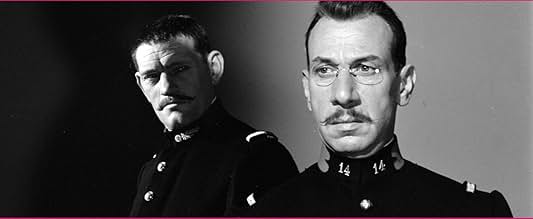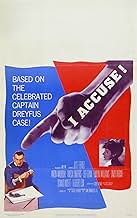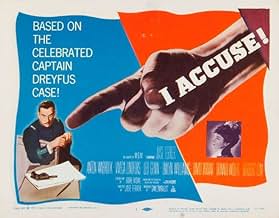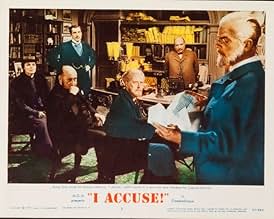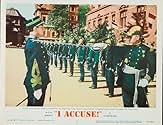Añade un argumento en tu idiomaIn 1894 France, a Jewish officer in the French Army is falsely accused of spying for Germany.In 1894 France, a Jewish officer in the French Army is falsely accused of spying for Germany.In 1894 France, a Jewish officer in the French Army is falsely accused of spying for Germany.
José Ferrer
- Captain Dreyfus
- (as Jose Ferrer)
Argumento
¿Sabías que...?
- CuriosidadesThis movie was not shot in widescreen. It was converted to CinemaScope in the final print after having been shot in standard Academy ratio, much like some movies, which are "matted" after having been shot in Academy ratio. The process used was contemporary of SuperScope and a forerunner of Super 35. It was filmed using spherical lenses at an aspect ratio of 1.37:1. In the printing process, the images were cropped to a height of two perforations, giving them an aspect ratio of 2.36:1. The images were then stretched vertically to a height of four perforations, at which point they conformed to the standard CinemaScope-2 format.
- Citas
Émile Zola: This Esterhazy is one of the most glorious liars that ever drew breath. Why, the authority of it, the poise; the man's a genius!
- Créditos adicionales[Scrolling Prologue] In 1894 Alfred Dreyfus, a French Army officer, stood before a military tribunal accused of treason. The outcome of this trial, a trial that created an international sensation, is a brave chapter in the history of France, that nation which first proclaimed the Rights of Man.
Reseña destacada
Jose Ferrer was indubitably intelligent and impeccably liberal, as he was sure to let you know. He made a number of rather good movies, but he was not as brilliant as he thought, and his lack of the conventional movie virtues such as charm, sex appeal, or just friendly warmth was far more damaging than he knew.
This movie presents the story clearly and fairly, and there are some good performances, but on the whole it's very cold and dry.
Gore Vidal's script is also intelligent and, rarely for Hollywood historical films, does not contain a single vulgarism or anachronism. But, again, a few of these would be a small price to pay for some zest and passion. A more surprising omission is wit, which one would have expected from Vidal.
And there is another omission. The Dreyfus case was an indication of the degree of anti-semitism among the French as a whole, not only the military. The hatred of Jews that the case provided an opportunity to express was so intense, widespread, and violent that many left the country. We are told at the beginning of the film that Dreyfus is a Jew, and a bit later there are a couple of mentions of the fact that most people do not like or trust them. But that's it. There is no sense at all of the vicious and hysterical feelings that were voiced by the ignorant public and whipped up by the media. The mobs have only a pathetic two or three placards, none of which mention Jews, and when they shout insults we do not hear the word. Ironically, this is a heavily censored movie about people who do not tell the truth.
As Dreyfus, Ferrer is very correct, proper, and unimaginative. After he is cruelly mistreated we see him suffer, but his pain is not has affecting as it should be--there is something actorish about it. The acting honors go to David Farrar as Dreyfus's brother and Leo Genn as his one supporter on the general staff--indeed, the latter looks so good in his full moustache and acts so suavely that we seem at times to be watching James Mason.
You really know the movie has failed when the person in whom we are most interested, and most anxious to see again, is Esterhazy, the real spy, who throws the innocent Dreyfus to the wolves. Anton Walbrook is so steeped in seedy charm, so much the would-be languorous fatalist with one eye nervously alert that we are keen to see someone with an active mind rather than another puppet in this story that is far more complex and unsavory than the film makes out.
Gore Vidal's script is also intelligent and, rarely for Hollywood historical films, does not contain a single vulgarism or anachronism. But, again, a few of these would be a small price to pay for some zest and passion. A more surprising omission is wit, which one would have expected from Vidal.
And there is another omission. The Dreyfus case was an indication of the degree of anti-semitism among the French as a whole, not only the military. The hatred of Jews that the case provided an opportunity to express was so intense, widespread, and violent that many left the country. We are told at the beginning of the film that Dreyfus is a Jew, and a bit later there are a couple of mentions of the fact that most people do not like or trust them. But that's it. There is no sense at all of the vicious and hysterical feelings that were voiced by the ignorant public and whipped up by the media. The mobs have only a pathetic two or three placards, none of which mention Jews, and when they shout insults we do not hear the word. Ironically, this is a heavily censored movie about people who do not tell the truth.
As Dreyfus, Ferrer is very correct, proper, and unimaginative. After he is cruelly mistreated we see him suffer, but his pain is not has affecting as it should be--there is something actorish about it. The acting honors go to David Farrar as Dreyfus's brother and Leo Genn as his one supporter on the general staff--indeed, the latter looks so good in his full moustache and acts so suavely that we seem at times to be watching James Mason.
You really know the movie has failed when the person in whom we are most interested, and most anxious to see again, is Esterhazy, the real spy, who throws the innocent Dreyfus to the wolves. Anton Walbrook is so steeped in seedy charm, so much the would-be languorous fatalist with one eye nervously alert that we are keen to see someone with an active mind rather than another puppet in this story that is far more complex and unsavory than the film makes out.
- rhoda-9
- 1 jul 2020
- Enlace permanente
Selecciones populares
Inicia sesión para calificar y añadir a tu lista para recibir recomendaciones personalizadas
- How long is I Accuse!?Con tecnología de Alexa
Detalles
Taquilla
- Presupuesto
- 1.800.000 US$ (estimación)
- Duración1 hora 39 minutos
- Color
- Mezcla de sonido
- Relación de aspecto
- 2.35 : 1
Contribuir a esta página
Sugerir un cambio o añadir el contenido que falta


